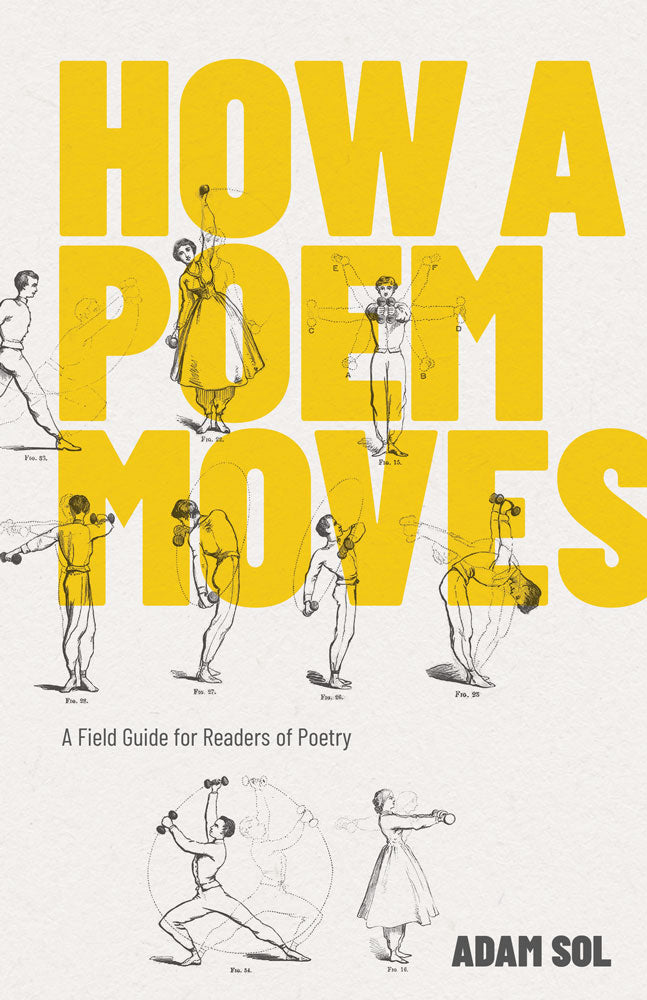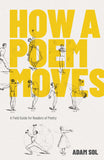How a Poem Moves: A Field Guide for Readers of Poetry
$14.99-
A collection of playfully elucidating essays to help reluctant poetry readers become well-versed in verse
Developed from Adam Sol’s popular blog, How a Poem Moves is a collection of 35 short essays that walks readers through an array of contemporary poems. Sol is a dynamic teacher, and in these essays, he has captured the humor and engaging intelligence for which he is known in the classroom. With a breezy style, Sol delivers essays that are perfect for a quick read or to be grouped together as a curriculum.
Though How a Poem Moves is not a textbook, it demonstrates poetry’s range and pleasures through encounters with individual poems that span traditions, techniques, and ambitions. This illuminating book is for readers who are afraid they “don’t get” poetry but who believe that, with a welcoming guide, they might conquer their fear and cultivate a new appreciation.
BUY FROM:
Price may vary by retailer
Check availability at your local Canadian independent bookstore:
Remember that most stores can easily order books they don’t currently have in stock.
BUY FROM ECW PRESS:
Adam Sol is an award-winning poet, writer, and teacher. He has published four collections of poetry, including Crowd of Sounds, which won Ontario’s Trillium Book Award. He lives in Toronto, Ontario, with his wife, Rabbi Yael Splansky, and their three sons.
-
Published: March 2019
ISBN: 9781770414563
Dimensions: 5.5 x 8.5 in.
Pages: 216
Reviews
“This unassuming book provides a great public service — it removes the shroud of mystery that hovers between too many readers and the world of poetry … Sol deserves to be read widely and freely; his humble witness to the simple art of reading may be this book’s most important gift. Libraries should have multiple copies.” — Library Journal Starred Review
“One wants to reread the poems, linger over Sol’s arguments … How a Poem Moves certainly revealed exciting new work to this reader of contemporary poetry, and it evinces the dizzying numbers and varieties of poems produced in North America today. We need more of this kind of thing, and Sol’s project might move more of us to make public our readings as much as poets make public their poems.” — Quill & Quire
“It provides a gateway for some of us to discover a new pleasure, and others of us to take a closer look at the poetry we love.” — Toronto Star
“[Sol] has a likeable professor's skill for outlining complex theories and entire literary movements in a few sentences . . . Each time a chapter opens with a seemingly impenetrable poem, we wonder how Sol is going to handle this one. But the difficulty only energizes him: he's like a street juggler picking up sword after flaming sword. For the most part, Sol asks questions and points things out . . . Each question opens a door into a once inaccessible text.” — Literary Review of Canada
“There is in our wounded world a great need for the balm and challenge poetry can provide. These beautiful, rich, and often surprising meditations get the reader excited about the gift that poems contain. Adam Sol trains the ear as much as the mind's eye. He is the Roger Tory Peterson of poetry. This is a book I will pass out like religious tracts to my friends. I am grateful for it.” — Shelagh Rogers, Host and Producer at The Next Chapter, CBC Radio One
“Sol presents the poem, breaks it down, and explains the verse. He guides the reader into the secrets the poem holds . . . Easy to understand explanations allow the reader to gain confidence in what they read and hopefully read further poetry on their own.” — Evil Cyclist blog
“He's lively, accessible and I swear will convert even those who think poetry's beyond them.” — Toronto Star
“Sol believes that anyone who tackles challenging essays, articles, and interviews is well equipped to appreciate the verbal art of poems . . . In his effort to provide this kind of encouragement, Sol adopts the conceit of a naturalist guide. As a park ranger directs hikers’ attention to the shapes and colors of plants and trees, to the sounds and motion of birds and animals along a trail, Sol points out the shape, sound, and flow of 36 selected poems.” — The Christian Century
“How a Poem Moves is a clever, satisfying listen that will make anyone feel like they, too, can ‘get’ poetry.” — Paste Magazine
“Going beyond the question of what poems mean, Sol investigates how they work — how they elicit emotion, provide or withhold information, and construct memorable images. His selections, largely derived from his time as a juror for the 2015 Griffin Poetry Prize, tend toward the relatively lesser-known, making this survey equally worthwhile for beginners who can learn from Sol’s instruction and for more seasoned readers who will delight in the new discoveries contained within.” — Publishers Weekly
“Sol is particularly sensitive to the value of the as-yet-undefined, since giving voice to the contradictory is poetry’s principal strength … But his greatest skill is in underlining the potency of aural effects: He is always on the lookout for alliteration, assonance and consonance, for hidden rhymes and barely-there metres … This is truly a welcoming book — at once an educational snapshot of the contemporary literary scene and a useful example of how to teach for educators themselves.” — Globe and Mail
“Adam Sol approaches poetry with a unique sensitivity; one that illustrates with exceptional clarity and insight, just how a poem moves.” — Scott Griffin, founder of the Griffin Poetry Prize
“In short, conversational essays that tease out music and meaning in equal measure, Adam Sol explores the living, beating heart of poetry. With an eye to poets of diverse backgrounds and aesthetic modes, and featuring impromptu asides on rhythm and meter, How a Poem Moves is just as at home in the university classroom as the doctor’s waiting room. Rich with lively commentary and shrewd insight, these essays trace a sharp and considerate mind at work. Sol is a thoughtful and affable guide to ignite — or reignite — a love of poetry.” — Cassidy McFadzean, award-winning author of Hacker Packer
“How a Poem Moves is the perfect antidote to the condition commonly known as Fear of Poetry. And Adam Sol is the perfect companion on this tour of the sounds, sights, and emotional delights of poetry. As someone who’s spent most of her life reading and writing poems, I’m thrilled by Sol’s ability to describe what he loves in a way that teaches me to see it, too.” — Tracy K. Smith, U.S. Poet Laureate and Pulitzer Prize–winning author of Life on Mars
“There is something delightfully casual about Sol’s observations, one that doesn’t sacrifice critical acumen or scholarly purpose, but one that can be enjoyed by both the casual reader and literary insider, and his list of subjects move outward from his own reading interest to the wider literary community . . . The strength of the collection comes from his extensive knowledge, written in such a way as to allow everyone in.” — Rob Mclennan’s blog
“Sol manages to create a persona who is affable without pandering, who informs without being pedantic, who is open-minded without being self-congratulatory . . . He's like one of those teachers you can't help liking because they're just so endearingly enthusiastic about their subject . . . That poetry asks us to slow down and look again makes it one of the most urgently necessary art forms of our time. I am so grateful to Adam Sol for this invitation to move through it together.” ” — Canadian Notes & Queries
“If reading poetry can seem intimidating, there's one book I've found that really helps with that. It's Toronto poet Adam Sol's How a Poem Moves … where he acts as an enthusiastic guide to how to approach a poem (one of which is, lucky for me, to read certain poems out loud).” — Toronto Star


